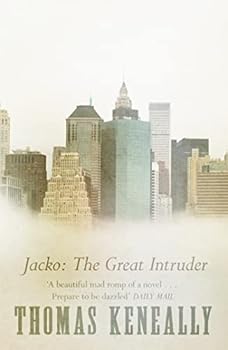Jacko the Great Intruder
Select Format
Select Condition 
Book Overview
No Synopsis Available.
Format:Paperback
Language:English
ISBN:0340632437
Release Date:January 1995
Publisher:Trafalgar Square
Length:384 Pages
Weight:0.62 lbs.
Dimensions:7.8" x 1.1" x 5.1"
Customer Reviews
3 ratings
Not Schindler's List, this is Keneally's lighter side.
Published by Thriftbooks.com User , 22 years ago
Thomas Keneally is an amazingly versatile writer who seems to do everything well, whether it be intense dramatic fiction, such as Schindler's List, Confederates, and The Chant of Jimmie Blacksmith; biography, such as An American Scoundrel, about Gen. Dan Sickles; or, in this case, an amusing roman a clef and gentle satire. Fictionalizing the life of a TV personality named Jacko, who suddenly confronts and often embarrasses ordinary citizens in their homes, Keneally brings his huge personality to life by acting both as an omniscient narrator and as a caring and sensitive confidante to Jacko, sometimes participating in the action himself. As Jacko, an Australian who has found a niche in New York TV, conducts a search for a young woman who has been kidnapped and held prisoner for five years, Keneally shows Jacko to be a man of some conscience, but also an unregenerate womanizer, egotist, and sometimes insufferable boor. Jacko's father, Stammerin' Jack, and his irrepressible mother Chloe, who live on a remote cattle ranch in The Northern Territories; his opera-loving brother Frank, who lives the effete life of an aesthete in Sydney; and various lovers and wives join with some of Australia's most notable (real) characters to enliven Keneally's narrative with tongue-in-cheek anecdotes and moments of sensitivity and great poignancy. Though Keneally disguises these real characters with pseudonyms, he does not otherwise change the details of their lives, so the novel becomes a sort of semi-autobiography of Keneally, as he includes stories of these characters and his relationship with them. Keneally is obviously the unnamed narrator, just as Patrick White, winner of the 1973 Nobel Prize for Literature, is clearly the model for Michael Bickham. Keneally obviously had great fun writing this book, and his ebullience shines through. With self-deprecating humor and a light hand, he pokes fun at people's foibles, while respecting the people themselves. Jacko's larger than life persona parallels the wide-openness of Australia itself, and Keneally's love for the country and its people, along with his need to escape sometimes, shine through. Mary Whipple
These people all live[d]!
Published by Thriftbooks.com User , 23 years ago
When this book finally reached North America, i urged my book discussion group to read it as a quality example of Australian writing. The reactions were nearly identical to those on this page - Jacko is a creep and the ending seems to drop you unfulfilled. Urging the group to reconsider the options Jacko faces on the last page against the character he's presented up to that point, the e-Mail over the next month became almost daily exchanges. The discussion group members realized how powerfully Keneally can depict people and what a superb story teller this author is. My discussion group was astounded to learn that nearly every character in this book actually lived. Jacko is the story of a son of Outback Oz having made the unlikely transplant to New York City. He's a major figure in New York television because he has a 'gimmick' - he literally 'crashes' people's homes first thing in the morning. Like all major figures, people come to him to solve their personal problems. In this case, it's a missing daughter. Jacko seizes on this occurrence as both a means of enhancing his image and perform a act of moral value. Jacko's quest for the girl and the demands of his own family's issues allow Keneally to take us from New York to the Australian bush and finally to the Berlin Wall on that fateful night it was reduced back to the level of Berlin streets.Keneally's ability to portray persona is amply demonstrated in his depiction of Jacko, writer Michael Bickham [anyone know who this really is?], Outback station owner Stammer Emptor, film director Mark Torlucci and the others. Perhaps Gunter is the only person in this narrative without a specific life model. The most poignant scene depicts the death of 'Barry Larson' who is based on a photographer Keneally worked with in producing a pictorial essay about life in the Australian bush. Chloe Emptor clearly achieves dominant status in this book. Only Australia, and its Northern Territory, could produce such a figure, and a writer like Keneally to portray her. Having read the autobiography of the woman Keneally bases this figure on, she should be gratified at the depiction.Too many American reviews of Keneally mark him as an "Australian" writer as if that somehow limited his abilities or his work lacks some indispensable element. Nothing could be more misleading when assessing his work. His stories are universal in both circumstances and character development. That he lives in Australia and often [but not always] sets some or all of his tales in that environment shouldn't detract from the quality of his portrayal of real lives and circumstances. This book is too valuable to be relegated to the "Out of Stock" bin. Its historical value is surpassed only by the quality of Keneally's writing. He has few, if any, peers in the business of story-telling. Jacko is a book i have no hesitation about pulling off the shelf and starting again at page one. He can hold the
A classic.
Published by Thriftbooks.com User , 23 years ago
A big hearted book written about a big hearted man. People said that the ending was a let down, but I feel it is what makes the book a classic. JACKO has genuine Australian charm, written with sympathy for the characters.






